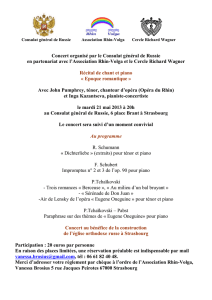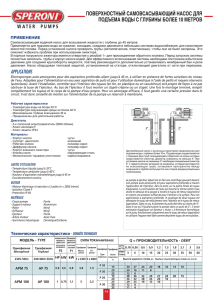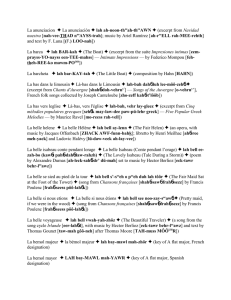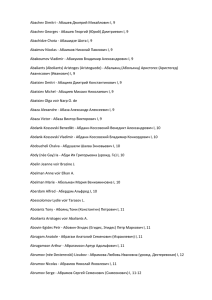Document 2124629
advertisement
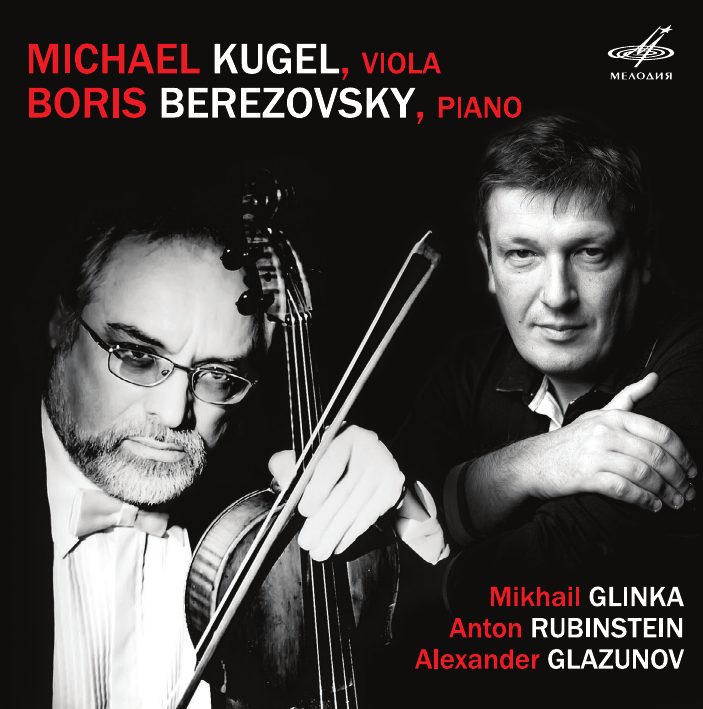
2 В мировой музыкальной культуре имена выдающихся исполнителей на альте единичны. Такая ситуация сложилась потому, что на протяжении долгого времени альт считался инструментом в большей степени ансамблевым, чем сольным. Лишь в XX веке на концертной эстраде заблистали выдающиеся альтисты-виртуозы, раскрывшие изумительный по своей выразительности тембр этого инструмента. Репертуар для альта соло, до той поры значительно уступавший колоссальному объему музыкальных произведений, созданных, например, для его ближайшей родственницы – скрипки, начал стремительно расширяться за счет произведений современных композиторов, которые вдохновлялись искусством виртуозов. Почетное место в ряду знаменитых исполнителей на альте занимает выдающийся музыкант, композитор и автор книг о музыкальном исполнительстве Михаил Кугель. Михаил Кугель родился в Харькове в 1946 г., окончил Харьковское музыкальное училище по классу скрипки, а позже учился в Ленинградской консерватории по классам альта, композиции и дирижирования. В 1975 г. он завоевал первую премию на Международном конкурсе альтистов в Будапеште. Кугель был солистом Московской государственной филармонии, играл в составе Квартета имени Бетховена. До 1990 г. он преподавал в Московской консерватории, затем до 1996 г. был профессором Иерусалимской академии музыки и танца имени С. Рубина в Израиле. С 1996 г. музыкант живет в Бельгии и преподает в Королевских консерваториях Гента (Бельгия) и Маастрихта (Голландия). Ученики Михаила Кугеля – солисты и профессора в десятках стран Европы, Америки, Австралии и Дальнего Востока. Михаил Кугель выступал со многими знаменитыми оркестрами в крупнейших концертных залах по всему миру, принимал участие в фестивалях и мастер-классах в Европе, Америке, Азии и на Дальнем Востоке. Он – член жюри Международных конкурсов в Англии, Германии, Италии, Австрии, Израиле, Бельгии, США, Хорватии, Голландии и др. Музыкант записал более двадцати дисков альтовой музыки и осуществил ряд записей как дирижер и исполнитель на виоле д’амур. Михаил Кугель – автор многочисленных транскрипций (некоторые из них представлены в данном альбоме) и произведений для альта, в числе которых Концерт для альта с оркестром, сонаты, дуэты, сюиты, прелюдии и др. Его сочинения (например, Соната для фортепиано, квартеты, Камерная симфония) были опубликованы издательствами Бельгии, США и Швеции. Помимо музыкальных произведений перу Михаила Кугеля принадлежат две книги: «История одной эпохи. Интерпретация двух произведений для альта», посвященная трактовкам Альтовой сонаты Дмитрия Шостаковича и Концерта для альта Белы Бартока, и «Шедевры инструментальной музыки». В этом году выходит новая книга музыканта: «Педагогические Опыты или Школа игры на скрипке (альте) для взрослых». О своей разносторонней музыкальной деятельности Михаил Кугель отозвался так: «В своей деятельности я попытался вернуться на 250–300 лет назад – в эпоху барокко, когда музыканты были и композиторами, и исполнителями и писали статьи, книги одновременно… Сейчас принята такая узковатая специализация: исполнителей много замечательных, но если они и пишут, то в основном автобиографии. У меня есть что-то, чем, я считаю, можно поделиться. В итоге время покажет, нужно это кому-то или я поделился в пустоту… Миссия музыканта, на мой взгляд, действительно существует. Это помирить людей друг с другом». Борис Березовский – один из самых выдающихся, ярких и востребованных пианистов современности. Он родился в 1969 г. в Москве, учился в Московской консерватории в классе профессора Элисо Вирсаладзе. В 1987 г. Березовский получил четвертую премию на конкурсе пианистов в Лидсе (Великобритания), а в 1990 г. завоевал золотую медаль на IX Международном конкурсе имени П.И. Чайковского в Москве. Кроме того, уже после победы на конкурсе им. П.И. Чайковского он брал уроки у пианиста Александра Саца, ученика Генриха Нейгауза. Борис Березовский регулярно выступает с лучшими оркестрами мира, а также дает сольные концерты во многих прославленных музыкальных центрах, таких как Берлинская филармония, Амстердамский Concertgebouw, 3 4 Лондонский Royal Festival Hall, Театр на Елисейских полях в Париже и др. В настоящее время пианист живет в Бельгии, где и состоялось его знакомство с Михаилом Кугелем. Дуэт Михаила Кугеля и Бориса Березовского – одно из ярчайших явлений современной музыкальной жизни. «Слушая игру этих выдающихся солистов, восхищаешься их сосредоточенной и вдумчивой исполнительской манерой, внутренней свободой интерпретаций и удивительной гармонией ансамбля» (В. Александров, из репортажа для радио «Орфей» о московском концерте дуэта). Фирма «Мелодия» представляет несколько записей произведений русских композиторов из репертуара ансамбля. Особенно интересны редко исполняемые альтовые сонаты Михаила Глинки и Антона Рубинштейна. Неоконченная соната для альта и фортепиано – ранний шедевр Глинки – больше ста лет оставалась неизвестной музыковедам и исполнителям. Заслуга в возрождении произведения принадлежит профессору Московской консерватории Вадиму Борисовскому, который реконструировал и опубликовал сонату, а также стал ее первым исполнителем в 1932 г. Глинка написал только две части: первую в 1825 г., вторую в 1828 г. Третья часть не была написана ни тогда, ни много лет спустя, когда в 1852 г. композитор вновь вернулся к сонате, отредактировав первую и частично вторую части. Соната Рубинштейна фа минор, соч. 32, по словам Михаила Кугеля, «по праву входит в золотой репертуар камерно-инструментальной музыки XIX века, когда для альта было написано крайне мало сочинений, особенно в России. Совершенно феноменальная соната, основанная на русских темах, удивительно красивая музыка…». «Элегия» для альта и фортепиано, соч. 44, была написана Александром Глазуновым для Митрофана Беляева – мецената и ценителя музыки, который издал почти все сочинения композитора. Программу дополняют сольные записи Михаила Кугеля. Строгая и возвышенная «Элегия» Игоря Стравинского была написана в 1944 г. по просьбе альтиста Жермена Прево в память Альфонса Онну, основателя квартета «Pro arte». Со сдержанной «Элегией» контрастируют два сочинения австрийского скрипача и композитора XIX века Генриха Вильгельма Эрнста (переложения для альта Михаила Кугеля). Это одно из самых значительных произведений Эрнста – виртуознейший «Большой каприс» на тему баллады Шуберта «Лесной царь». И этюд № 6 – Интродукция, тема и вариации на тему народной песни «Последняя роза лета» – заключительный в цикле шести этюдов, каждый из которых композитор посвятил одному из крупнейших скрипачейсовременников (Фердинанду Лаубу, Просперу Сэнтону, Йозефу Иоахиму, Анри Вьётану, Йозефу Хельмесбергеру и Антонио Бадзини). 5 6 The names of the outstanding viola performers are singular in the world music culture. Such a situation could be explained by the fact that the viola had long been considered an ensemble instrument rather than a solo one. Only as late as in the 20th century remarkable virtuosos of the viola began to shine on concert stage and disclosed an amazingly expressive timbre of the instrument. The repertoire for solo viola, which had been considerably smaller than that for its nearest relation violin, began to expand rapidly thanks to contemporary composers who were inspired with the virtuosi’s art. Michael Kugel, a prominent musician, composer and author of books on music performing art, takes a place of honour among the famous viola players. Michael Kugel was born in Kharkov in 1946. He finished Kharkov Music College as violinist, and later studied viola, composition and conducting at the Leningrad Conservatory. In 1975, he won the first prize at the International Viola Competition in Budapest. Kugel was a soloist of the Moscow Philharmonic Society and a member of the Beethoven Quartet. He taught at the Moscow Conservatory until 1990 and was a professor of the Jerusalem Rubin Academy of Music and Dance in Israel until 1996. The musician has resided in Belgium since 1996 and taught at the royal conservatories of Ghent, Belgium, and Maastricht, the Netherlands. Soloists and professors in dozens of countries of Europe, America, Australia and the Far East are Michael Kugel’s students. Michael Kugel has performed with many famous orchestras at the best music hall around the world, participated in festivals and master classes in Europe, America, Asia and the Far East, and been a jury member of the international competitions in England, Germany, Italy, Austria, Israel, Belgium, the United States, Croatia, the Netherlands, etc. The musician has recorded more than twenty albums of viola music and made a number of recordings as a conductor and viola d’amore player. Kugel is an author of numerous transcriptions (some are featured on this album) and works for viola, including the Concerto for Viola and Orchestra, sonatas, duets, preludes and others. His compositions, for example the Sonata for Piano, quartets, Chamber Symphony, have been published in Belgium, the United States and Sweden. Apart from the musical compositions, Kugel has penned two books – “History of One Epoch. Interpretation of Two Works for Viola” dedicated to interpretations of Dmitri Shostakovich’s Viola Sonata and Béla Bartók’s Concerto for Viola, and “Masterpieces of Instrumental Music.” The musician’s new book “Educational Experiments, or School of Violin (Viola) Performance for Adults” will be released later this year. This is what Michael Kugel wrote about his diverse music activities: “In my activities I made an attempt to look back to 250 or 300 years ago, to the Baroque era, when musicians were composers and performers, wrote articles and books, all at the same time… At present, a somewhat narrowish specialization is a custom: there are many wonderful performers, but when they write, they write their autobiographies mostly. I have something that I think I can share. In the long run, time will tell if someone needs it or I shared it into emptiness… In my opinion, a musician’s mission really exists. It is to reconcile people with each other.” Boris Berezovsky is one of the best and brightest pianists currently in demand. He was born in 1969 in Moscow and studied at the Moscow Conservatory under professor Eliso Virsaladze. In 1987, Berezovsky received a fourth prize at the piano competition in Leeds, England, and in 1990 won a gold medal at the 9th International Tchaikovsky Competition in Moscow. Besides, after his victory at the Tchaikovsky Competition, he took lessons from pianist Alexander Sats, a pupil of Heinrich Neuhaus. Berezovsky has regularly performed with some of the leading orchestras of the world and played solo concerts at many famous music centres such as the Berlin Philharmonie, Concertgebouw in Amsterdam, Royal Festival Hall in London, Théâtre des Champs-Élysées in Paris and others. At present, the pianist resides in Belgium where he met Michael Kugel. The duet of Michael Kugel and Boris Berezovsky is one of the brightest phenomena of modern music life. “Listening to these outstanding soloists, one can’t help but admire their focused and thoughtful performing manner, their internal freedom of interpretation and amazing harmony of ensemble,” 7 8 said Victor Alexandrov, a reporter for Orpheus Radio, about the duet’s Moscow concert. Firma Melodiya presents several recordings of compositions by Russian composers from the ensemble’s repertoire. The rarely performed viola sonatas by Mikhail Glinka and Anton Rubinstein are especially interesting. The Unfinished Sonata for viola and piano, an early masterpiece by Glinka, had remained unknown to musicologists and performers for more than a hundred years. Professor of the Moscow Conservatory Vadim Borisovsky should be given credit for reviving the piece. He reconstructed and published the sonata, and also became its first performer in 1932. Glinka composed only two movements: one in 1825 and the other in 1828. The third movement was composed neither then nor many years after when the composer revisited the sonata in 1852 to edit the first movement and partially the second one. According to Michael Kugel, Rubinstein’s Sonata in F minor, Op. 32, is “by right a part of the golden repertoire of chamber instrumental music of the 19th century when an extremely small number of violin pieces was composed, especially in Russia. A totally phenomenal sonata based on Russian themes, surprisingly beautiful music…” Alexander Glazunov composed his Elegy for viola and piano, Op. 44, for Mitrofan Belyayev, a patron and music lover who published almost all of the composer’s works. The programme also includes Michael Kugel’s solo recordings. A strict and elated Elegy by Igor Stravinsky was composed in 1944 at violist Germain Prévost’s request in memory of Alphonse Onnou, a founder of the Pro Arte Quartet. Two compositions by Austrian violinist and composer of the 19th century Heinrich Wilhelm Ernst contrast with a restrained Elegy. A most virtuosic Grand Caprice on the theme of Schubert’s ballad Forest King is one of Ernst’s most remarkable compositions. And Etude No. 6 – Introduction, Theme and Variations on the traditional song The Last Rose of Summer – is concluding in a cycle of six etudes each dedicated to one of the greatest contemporary violinists (Ferdinand Laub, Prosper Sainton, Joseph Joachim, Henri Vieuxtemps, Joseph Hellmesberger and Antonio Bazzini). 9 10 L’histoire de la musique ne connaît que très peu de grands altistes. Cela est dû au fait que pendant longtemps l’alto a été considéré comme une partie intégrante des ensembles, plutôt qu’un instrument solo. Ce n’est qu’au XX siècle que des altistes virtuoses ont fait irruption sur la scène des salles de concerts et ont fait découvrir au public le timbre de cet instrument, expressif et unique dans son genre. Le répertoire pour alto solo, auparavant considérablement réduit par rapport à celui de violon, le parent proche de l’alto, s’est très vite élargi grâce aux œuvres de compositeurs contemporains, inspirés par la maîtrise de l’instrument des musiciens virtuoses. Parmi les grands altistes, Michael Kugel, un musicien éminent, compositeur et auteur de livres sur l’interprétation musicale, occupe une place à part. Michael Kugel est né à Kharkov en 1946, il a fait ses études à l’Ecole supérieure de musique de Kharkov dans la classe de violon, puis a étudié le violon, la composition, et la direction d’orchestre au Conservatoire de Leningrad. En 1975, il s’est vu décerner le Premier Prix du Concours international d’altistes à Budapest. Kugel a été soliste de la Philharmonie de Moscou, il a également fait partie du Quatuor Beethoven. Jusqu’en 1990 il a enseigné au Conservatoire de Moscou, puis jusqu’en 1996 il a été professeur à l’Académie de musique et de danse S. Roubine de Jérusalem, à Israël. Depuis 1996, le musicien habite en Belgique et enseigne aux Conservatoires royaux de Gand (Belgique) et de Maastricht (Pays-Bas). Les disciples de Michael Kugel sont des solistes et des professeurs qui exercent leur art dans des dizaines de pays d’Europe, d’Amérique, d’Australie et de l’Extrême Orient. Michael Kugel s’est produit avec un grand nombre d’orchestres de renom dans les salles de concert les plus prestigieuses à travers le monde, il a pris part dans de nombreux festivals et classes de maître en Europe, en Amérique, en Asie et à l’Extrême Orient. Il est membre de jury de Concours internationaux en Angleterre, en Allemagne, en Italie, en Autriche, à Israël, en Belgique, aux EtatsUnis, en Croatie, aux Pays-Bas etc. Le musicien a enregistré plus de vingt disques de musique pour alto et a effectué plusieurs enregistrements en tant que chef d’orchestre et interprète de la viole d’amour. Michael Kugel est l’auteur de nombreuses transcriptions (dont certaines font partie du présent disque), ainsi que d’œuvres pour alto, parmi lesquelles le Concerto pour alto et orchestre, des sonates, des duos, des suites, des préludes etc. Ses œuvres (notamment, la Sonate pour piano, des quatuors, la Symphonie de chambre) ont été publiées par des maisons d’édition musicale en Belgique, aux Etats-Unis et en Suède. A côté des œuvres musicales, Michael Kugel a créé deux livres : L’Histoire d’une époque. L’Interprétation de deux œuvres pour alto consacré aux interprétation de la Sonate pour alto de Dmitri Chostakovitch et du Concerto pour alto de Béla Bartók et Chefs-d’œuvre de la musique instrumentale. Cette année va paraitre un nouveau livre du musicien, Expériences pédagogiques, ou Ecole de violon (alto) pour les adultes. Voilà ce que Michael Kugel a écrit à propos de son activité musicale à multiple facettes : « Dans mon activité j’ai essayé de retourner 250–300 ans en arrière, à l’époque baroque, lorsque les musiciens étaient à la fois compositeurs et interprètes, ainsi que auteurs d’articles et de livres… Aujourd’hui on pratique la spécialisation un peu trop pointue : il y a beaucoup de musiciens remarquables, mais si ça leur arrive d’écrire quelque chose, pour la plupart du temps il s’agit d’autobiographies. J’ai quelque chose que je voudrais partager. Seul le temps prouvera si ça a été utile pour quelqu’un, ou bien je l’ai fait dans le vide… Je crois qu’un musicien a vraiment une mission. Il doit aider les gens à faire la paix les uns avec les autres ». Boris Berezovski est l’un des pianistes les plus remarquables, les plus brillants et les plus sollicités de nos jours. Il est né en 1969 à Moscou et a fait ses études au Conservatoire de Moscou, dans la classe du professeur Elisso Virssaladze. En 1987, Berezovski a obtenu le Quatrième prix du Concours international de piano de Leeds (Royaume-Uni), et en 1990 il s’est vu décerner la Médaille d’or au XI Concours international Tchaïkovski à Moscou. Par ailleurs, après la victoire au Concours Tchaïkovski, il a pris des cours auprès du pianiste Alexandre Satz, disciple d’Heinrich Neuhaus. Boris Berezovski se produit régulièrement avec les meilleurs orchestres du monde et donne des concerts dans de nombreuses salles prestigieuses, telles que la Philharmonie de Berlin, le Concertgebouw d’Amsterdam, le Royal Festival Hall de Londres, le Théâtre des Champs-Elysées de Paris et d’autres. Aujourd’hui, le pianiste habite en Belgique où il a fait la connaissance de Michael Kugel. 11 12 Le duo de Michael Kugel et de Boris Berezovski est l’un des événements les plus remarquables de la vie musicale actuelle. « Ecoutant le jeu de ces solistes extraordinaires on ne peut que s’exalter devant la manière réfléchie et concentrée de leur jeu, la liberté intérieure de l’interprétation et la parfaite harmonie de leur ensemble » (V. Alexandrov, extrait du repartage à l’antenne de Radio Orphée, à propos du concert du duo à Moscou). La maison de disques Melodia propose des enregistrements d’ouvres de compositeurs russes qui font partie du répertoire de l’ensemble. Les sonates pour alto de Mikhaïl Glinka et d’Anton Rubinstein, rarement interprétées, présentent un intérêt particulier. La Sonate inachevée pour alto et piano est un chef-d’œuvre créé par le jeune Glinka qui est resté inconnu des musicologues et des interprètes pendant plus de cent ans. La résurrection de cette œuvre est due au professeur du Conservatoire de Moscou Vadim Borissovski qui a reconstruit et publié la sonate, il a également été son premier interprète en 1932. Glinka n’a créé que deux mouvements : le premier en 1825 et le second en 1828. Le troisième mouvement n’a jamais été créé, ni à cette époque-là, ni plusieurs années plus tard, lorsque le compositeur a repris le travail sur la sonate en 1852 et a parachevé le premier mouvement et, partiellement, le second mouvement. La Sonate en fa mineur de Rubinstein, op. 32, selon l’expression de Michael Kugel, « à juste titre, fait partie du trésor de la musique instrumentale de chambre du XIX siècle, lorsque très peu d’œuvres ont été créées pour alto, surtout en Russie. C’est une sonate absolument extraordinaire, basée sur des thèmes russes, cette musique est d’une beauté incroyable ». Elégie pour alto et piano, op. 44, a été créée par Alexandre Glazounov pour Mitrofan Belaïev, mécène et fin connaisseur de la musique, qui a édité la plupart des œuvres du compositeur. Le programme est complété par des enregistrements solo de Michael Kugel. L’Elégie austère et sublime d’Igor Stravinski a été créée en 1944 à la demande de l’altiste Germain Prévost pour rendre hommage à Alphonse Onnou, fondateur du quatuor « Pro arte ». Cette Elégie à caractère réservé se distingue nettement des deux œuvres de Heinrich Wilhelm Ernst, violoniste et compositeur autrichien du XIX siècle (les transcriptions pour alto ont été effectuées par Michael Kugel). Le Grand caprice sur le thème de la ballade de F. Schubert Roi des Aulnes, d’une grande virtuosité, est l’une des œuvres majeures d’Ernst. L’Etude n° 6 – Introduction, Thème et Variations sur la chanson « La dernière rose d’été » termine le cycle de six études dont chacune est dédiée par le compositeur à un grand violoniste de son temps (Ferdinand Laub, Prosper Sainton, Joseph Joachim, Henri Vieuxtemps, Josef Hellmesberger et Antonio Bazzini). 13 1 2 3 Михаил Глинка Соната для альта и фортепиано ре минор (неоконченная) I. Allegro moderato . . . . . . . . . . . . . . . . . . . . . . . . . . . . . . . . . . . . 9.17 II. Larghetto ma non troppo (Andante) . . . . . . . . . . . . . . . . . . . . . . . . . 6.30 «Листок из альбома» . . . . . . . . . . . . . . . . . . . . . . . . . . . . . . . . . . 2.43 1 2 3 Mikhaïl Glinka Sonate pour alto et piano en ré mineur (inachevée) I. Allegro moderato . . . . . . . . . . . . . . . . . . . . . . . . . . . . . . . . . . . . 9.17 II. Larghetto ma non troppo (Andante) . . . . . . . . . . . . . . . . . . . . . . . . . 6.30 Une feuille de l’album . . . . . . . . . . . . . . . . . . . . . . . . . . . . . . . . . . 2.43 4 5 6 7 Антон Рубинштейн Соната для альта и фортепиано фа минор, соч. 49 (редакция М. Кугеля) I. Moderato . . . . . . . . . . . . . . . . . . . . . . . . . . . . . . . . . . . . . . . . 8.37 II. Andante . . . . . . . . . . . . . . . . . . . . . . . . . . . . . . . . . . . . . . . . 5.20 III. Moderato con moto . . . . . . . . . . . . . . . . . . . . . . . . . . . . . . . . . . 6.17 IV. Allegro . . . . . . . . . . . . . . . . . . . . . . . . . . . . . . . . . . . . . . . . 6.23 4 5 6 7 Anton Rubinstein Sonate pour alto et piano en fa mineur, op. 49 (adaptation de M. Kugel) I. Moderato . . . . . . . . . . . . . . . . . . . . . . . . . . . . . . . . . . . . . . . . 8.37 II. Andante . . . . . . . . . . . . . . . . . . . . . . . . . . . . . . . . . . . . . . . . 5.20 III. Moderato con moto . . . . . . . . . . . . . . . . . . . . . . . . . . . . . . . . . . 6.17 IV. Allegro . . . . . . . . . . . . . . . . . . . . . . . . . . . . . . . . . . . . . . . . 6.23 8 Александр Глазунов «Элегия» для альта и фортепиано, соч. 44 . . . . . . . . . . . . . . . . . . . . . . 5.31 8 Alexandre Glazounov Elégie pour alto et piano, op. 44 . . . . . . . . . . . . . . . . . . . . . . . . . . . . . 5.31 9 Бонус-треки: Игорь Стравинский «Элегия» для альта соло . . . . . . . . . . . . . . . . . . . . . . . . . . . . . . . . 3.59 9 Titres bonus: Igor Stravinski Elégie pour alto solo . . . . . . . . . . . . . . . . . . . . . . . . . . . . . . . . . . . 3.59 Ф. Шуберт – Г.В. Эрнст 10 Большой каприс «Лесной Царь», соч. 26 (переложение для альта М. Кугеля) . . 3.52 F. Schubert – H.W. Ernst 10 Grand caprice sur le « Roi des Aulnes », op. 26 (transcription pour alto de M. Kugel) . . 3.52 Генрих Вильгельм Эрнст 11 Интродукция, тема и вариации на тему песни «Последняя роза лета» (переложение для альта М. Кугеля) . . . . . . . . . . . . . . . . . . . . . . . . . . 8.28 Heinrich Wilhelm Ernst 11 Introduction, Thème et Variations sur la chanson « La dernière rose d’été » (transcription pour alto de M. Kugel) . . . . . . . . . . . . . . . . . . . . . . . . . . 8.28 Общее время: 67.04 Durée totale : 67.04 Михаил Кугель, альт Борис Березовский, фортепиано (1–8) Michael Kugel, alto Boris Berezovski, piano (1–8) Записи с концертов 2002 (11), 2012–2013 (1–10) гг. Звукорежиссер – С. Вандер Бекен Enregistrements effectués lors des concerts en 2002 (11) et en 2012–2013 (1–10) Ingénieur du son – S. Vander Beken Редактор – Н. Сторчак Дизайн – А. Ким Перевод: Н. Кузнецов (англ.), Н. Рындина (франц.) Rédactrice – N. Stortchak Design – A. Kim Traduction : N. Kouznetsov (angl.), N. Ryndina (fr.)
